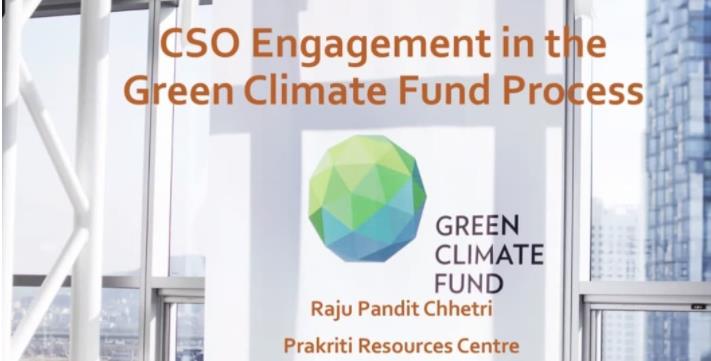
Green Climate Fund (GCF): Opaque process

Climate and Development Dialogue (C&D dialogue) is a loose network of 11 civil society organizations. It is facilitating dialogues and exchange of knowledge and learning on the interrelation between climate change, development and gender equality. It is also working to bridge the knowledge gap in these areas existing between the national and sub-national levels, and generate collective actions for policy interventions. C&D Dialogue has also been organizing a webinar series on ‘Climate Change and Development'.
A webinar on ‘CSO Engagement in Green Climate Fund: Strengthening Transparency and Accountability in Climate Finance in Nepal’ was organized on 27th May 2021. It brought together major stakeholders including national and international development agencies working in climate change, gender, and indigenous people’s issues. . They shared their experiences and learning on engaging civil society organizations, particularly women’s organizations and indigenous peoples in Green Climate Fund-supported projects in Nepal. Experts made presentations sharing their experiences of GCF project implementation.
Lead Presentation: Green Climate Fund: Opportunities and Challenges in Nepal-Raju Pandit Chhetri, ED, PRC
Panel Discussion: Enhancing CSO Engagement for Transparent and Accountable GCF Process
- CSOs and Safeguarding Indigenous Peoples in GCF Process and Projects-Tunga Bhadra Rai, NEFIN
- Mainstreaming Gender in GCF Process and Projects- Dr. Pasang Dolma Sherpa. ED, CIPRED
- Sharing learning on CSO Engagement in GCF Project Proposal Development and Implementation-Shrawan Adhikari, FAO
- Special Guest: Synthesizing and Concluding Remark- Dr. Bharat Pokhrel, Country Representative, HELVETAS, Swiss Inter coperation
Synthesis of Discussion:
- GCF is the largest dedicated climate fund established under the United Nations Framework Convention on Climate Change (UNFCCC) to finance climate actions in developing countries. Nepal has received two projects from GCF and a few other projects are in the pipeline. Alternative Energy Promotion Centre (AEPC) and National Trust for Nature Conservation (NTNC) have got GCF accreditation and Town Development Fund and Nepal Investment Bank Ltd. (NIBL) are in the process of obtaining GCF accreditation. International organizations like FAO, IUCN and the UNDP are developing and implementing projects funded by GCF in Nepal.
- National Designated Authority or NDA (Inter-Economic Cooperation and Coordination Division, Ministry of Finance in Nepal) has the primary role in engaging stakeholders and civil society in GCF process. GCF encourages developing countries to develop country programming strategic documents based on national-level climate change policies. In the process, it emphasizes consultations at different layers with CSOs, the private sector, women, and indigenous peoples for enhancing country ownership of the documents.
- GCF governing instrument has two civil society organizations as active observers, one from developed countries and another from developing countries. CSOs can contribute to monitoring GCF investment criteria like country ownership, a paradigm shift towards climate actions, etc. They can also play an important role in ensuring compliance with and safeguarding of GCF standards on social and environmental framework, IPs policy and gender policy.
- Civil society organizations are least aware of the GCF process and projects in Nepal. Very few consultations are organized to share information on GCF. GCF process in Nepal is opaque and only limited civil society organizations are part of the consultations. Primarily, it is the responsibility of NDA to proactively engage CSOs and other stakeholders in the GCF process and projects.
- GCF safeguards indigenous people’s rights in its investments. Engagement with indigenous peoples’ organizations is mandatory while designing and implementing GCF-funded projects.
- Gender mainstreaming is mandatory in GCF’s project proposal formulation and implementation and also in GCF’s governance structure. However in reality, gender mainstreaming is only limited to gender analysis in project formulation and ‘tick box’ criteria while approving the projects. The biggest predicament on gender mainstreaming is the attitudes and behaviors of decision-makers and project implementers towards women.
- It is imperative that civil society organizations continue constructive engagement in the GCF process in Nepal and hold the government and GCF- accredited organizations accountable towards poor and vulnerable communities, particularly women and indigenous peoples, and make GCF’s finance transparent.
- Innovative ideas like river bed farming etc. must be explored as potential projects for GCF support.
